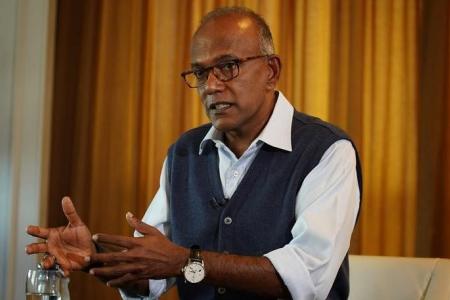10 Malaysians on death row in Singapore, mostly for drug offences: Shanmugam
PETALING JAYA - There are 10 Malaysians who remain on death row in Singapore, after two others were convicted of drug trafficking and hanged earlier this year.
This was revealed by Singapore's Minister for Home Affairs and Law K. Shanmugam, who said the 10 were awaiting their fate on whether they will be granted clemency.
"There are still some processes left such as clemency to be dealt with. Their convictions were mainly for (drug) trafficking," he said in a virtual interview with Malaysia's The Star, from his office earlier this week.
Not going into detail with regard to the clemency process, Mr Shanmugam said Singapore took a tough stance against drug trafficking and would not bow to local or international pressure to do away with capital punishment.
He said drug traffickers, whether from Malaysia or elsewhere, were fully aware of the consequences of Singapore's strict drug laws if caught and convicted.
Despite such laws in place, he said there are still some who deliberately smuggle in drugs for profit in such a way to avoid the mandatory death sentence if caught.
"Our evidence shows that they (traffickers) are consciously bringing in amounts of drugs into Singapore below the threshold of the death sentence," he added.
On April 27, Singapore executed Malaysian Nagaenthran Dharmalingam for drug trafficking despite local and international pleas.
Nagaenthran, 34, who was sentenced to death in 2010 for trafficking 42.72g of heroin into Singapore, was executed after the Court of Appeal dismissed a last-ditch challenge filed by his mother to set aside his conviction and death sentence.
This was followed on July 7 by Kalwant Singh, 32, being executed for drug trafficking.
He was arrested in Singapore in 2013 for possessing 60.15g of diamorphine, including trafficking 120.9g of the substance, and convicted three years later.
The minister said Singapore's tough drug policy has kept the city-state safe while saving many lives.
"In 1990, we were arresting about 6,000 drug abusers a year, and now we are arresting about 3,000, which is half of that, even though there has been an increase in the population," he said.
On local and external pressure to halt the executions of those sentenced to death, Mr Shanmugam said such pressure held little sway in Singapore to influence the fate of a convict once sealed.
He said such pressure would usually come from foreign countries and media that did not reflect consensus among the overwhelming majority of Singaporeans in favour of the mandatory death sentence for specific crimes.
"Nearly seven out of 10 Singaporeans or 70 per cent of our people say that mandatory death penalty for drug trafficking is appropriate. When talking about murder, nearly 80 per cent say there must be the mandatory death penalty," the minister said.
Acknowledging that there are parties who genuinely oppose capital punishment, he said such groups must be differentiated from those who exploit the issue for certain reasons.
"It is their right to speak out, but we ought to be careful as they are not reflective of the majority view," he added.
Asked if there would be a review of the law on mandatory capital punishment, particularly involving drug offences, he said this had been done years ago.
Mr Shanmugam, who was instrumental in getting laws on mandatory death sentences reviewed in 2012, said there were circumstances in which those charged with drug trafficking could avoid the gallows.
"An accused must be a 'pure courier' for the drugs and provide substantive assistance (to the police) in dismantling the drug rings," he said.
Get The New Paper on your phone with the free TNP app. Download from the Apple App Store or Google Play Store now


